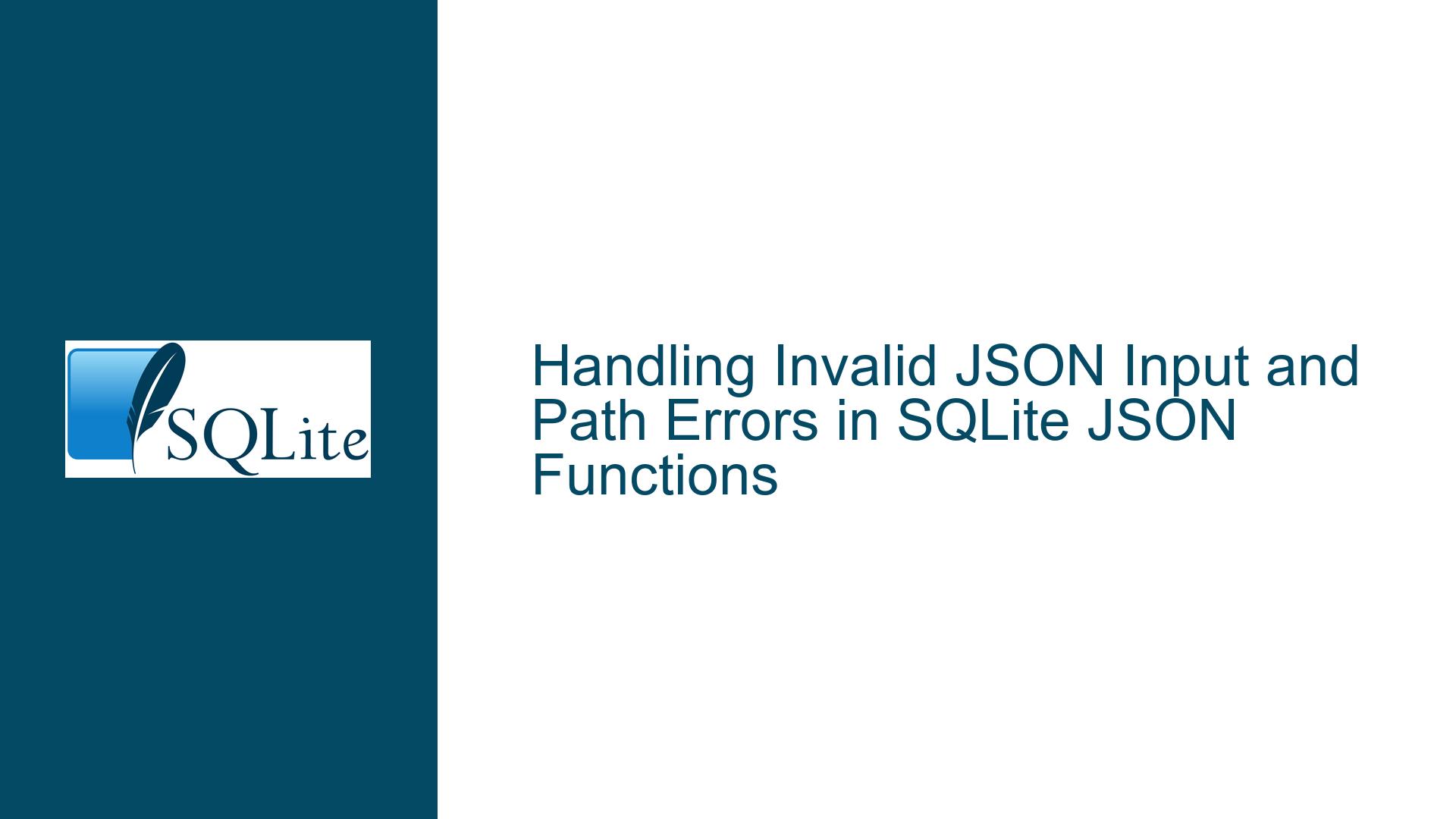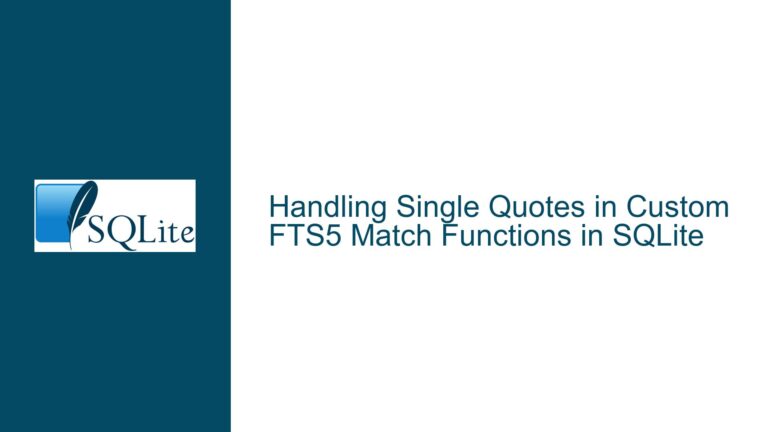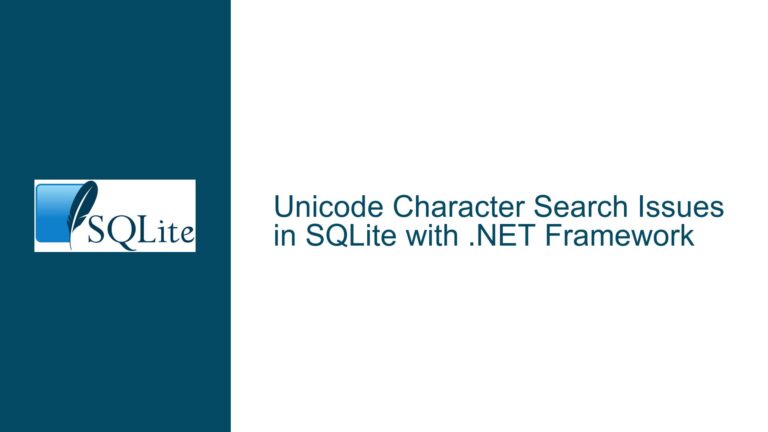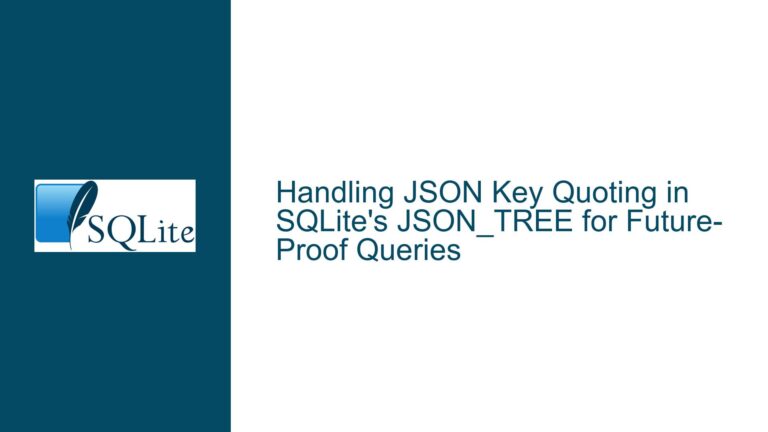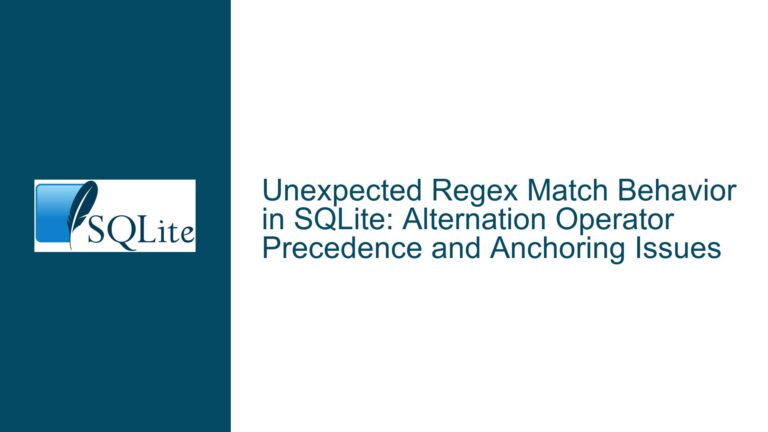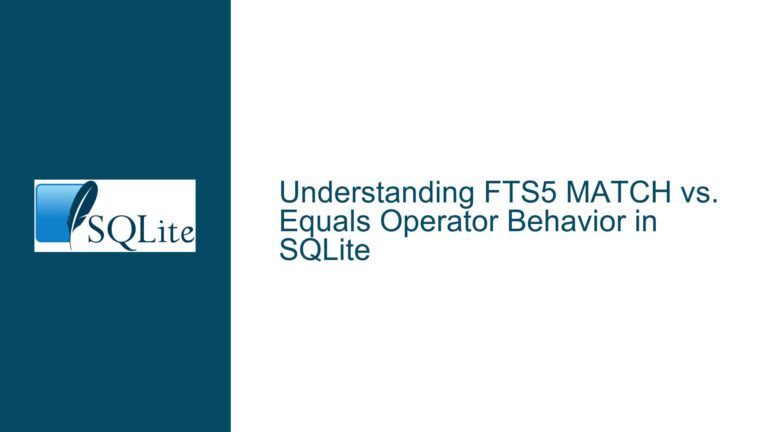Handling Invalid JSON Input and Path Errors in SQLite JSON Functions
Current Behavior of JSON Functions and Error Handling in SQLite
SQLite’s JSON extension provides a suite of functions (json(), json_extract(), json_insert(), etc.) for parsing and manipulating JSON data. By default, these functions adhere to strict validation rules: if the input string is not valid JSON, if the JSON path syntax is incorrect, or if the referenced path does not exist in the JSON structure, the functions will throw an error. For example, executing json_extract('{"a": invalid}', '$.a') results in an error message like "malformed JSON", while json_extract('{"a": 1}', '$.b') returns NULL because the path $.b does not exist in the JSON object.
The distinction between invalid JSON syntax and valid JSON with missing paths is critical. Errors caused by invalid JSON syntax (e.g., unquoted keys, missing commas) are treated as fatal runtime errors, whereas references to non-existent paths in valid JSON return NULL. This behavior creates a dichotomy: developers must handle syntax-related errors via exception-catching mechanisms (e.g., try...catch blocks in application code), while path-related issues can be managed within SQL itself using NULL checks.
The original discussion highlights a key pain point: runtime errors from invalid JSON input disrupt query execution and force developers to implement error handling outside the SQL layer. For applications processing user-supplied JSON or ingesting data from external sources, this creates significant complexity. The proposal to return NULL instead of throwing errors aims to unify error handling, allowing developers to manage both invalid JSON and invalid paths through SQL’s native NULL-handling features (e.g., COALESCE, IFNULL).
Root Causes of JSON-Related Errors in SQLite
To address the problem effectively, it is essential to categorize the scenarios that trigger JSON errors in SQLite:
Invalid JSON Syntax
Input strings that do not conform to JSON specifications (e.g., unescaped quotes, trailing commas, incorrect data types) will cause functions likejson()orjson_extract()to fail. For example,json('{"a": undefined}')throws an error becauseundefinedis not a valid JSON value.Invalid JSON Path Expressions
JSON paths that violate SQLite’s path syntax rules (e.g.,$.a[?],$..a[0]) will trigger errors. Path validation occurs at runtime, and even trivial mistakes like unmatched brackets or invalid operators can halt query execution.Type Mismatches in JSON Operations
Certain JSON functions require specific data types. For instance, attempting to usejson_set()on a non-JSON string (e.g.,json_set('plain text', '$.a', 10)) will fail because the input is not a JSON object or array.Ambiguity Between JSON Null and SQL NULL
A JSONnullvalue (e.g.,{"a": null}) is distinct from SQLNULL. When usingjson_extract('{"a": null}', '$.a'), SQLite returns a JSONnull, which is displayed asNULLin query results. However, this is not the same as the SQLNULLgenerated when a path does not exist (e.g.,json_extract('{"a": null}', '$.b')). This ambiguity complicates error handling, as developers must differentiate between explicit JSON nulls and missing paths.
Strategies for Preventing and Resolving JSON Errors
1. Pre-Validation of JSON Input
The most robust approach to avoid runtime errors is to validate JSON strings before passing them to SQLite functions. Use the json_valid() function to check for syntactic validity:
SELECT
CASE
WHEN json_valid(user_input) THEN json_extract(user_input, '$.path')
ELSE NULL
END AS extracted_value
FROM user_data;
This ensures that invalid JSON inputs are filtered out early, preventing errors in downstream operations.
Limitations:
json_valid()only checks syntax, not semantic correctness (e.g., it will accept{"a": NaN}even thoughNaNis not part of the JSON standard).- Path validation is still required separately.
2. Custom Path Validation Logic
Since SQLite lacks a built-in json_path_valid() function, developers can implement path validation using a combination of string operations and try...catch blocks in application code. For example:
# Python pseudocode for validating JSON paths
def is_json_path_valid(path):
try:
# Attempt a dummy extraction on a valid JSON object
cursor.execute("SELECT json_extract('{}', ?)", (path,))
return True
except sqlite3.OperationalError:
return False
This approach exploits SQLite’s error-throwing behavior to test path validity.
3. Coercing JSON Null to SQL NULL
To distinguish between JSON null and missing paths, explicitly convert JSON null to SQL NULL:
SELECT
CASE
WHEN json_extract(data, '$.a') IS NULL THEN NULL
ELSE json_extract(data, '$.a')
END AS a
FROM table;
Alternatively, use json_type() to inspect the value type:
SELECT
CASE
WHEN json_type(data, '$.a') = 'null' THEN NULL
ELSE json_extract(data, '$.a')
END AS a
FROM table;
4. Proposing a Pragma for Error Suppression
The original discussion suggests a pragma (e.g., PRAGMA ignore_json_errors = ON;) to suppress JSON errors and return NULL instead. While this is not natively supported in SQLite, developers can approximate this behavior using wrapper functions or virtual tables. For example, create a user-defined function (UDF) that encapsulates json_extract() with error handling:
// C pseudocode for a UDF that returns NULL on JSON errors
void safe_json_extract(sqlite3_context *ctx, int argc, sqlite3_value **argv) {
const char *json = (const char*)sqlite3_value_text(argv[0]);
const char *path = (const char*)sqlite3_value_text(argv[1]);
if (!json_valid(json)) {
sqlite3_result_null(ctx);
return;
}
// Execute json_extract and handle errors internally
// ...
}
Register this function in SQLite as safe_json_extract(), and use it in place of the native json_extract().
5. Mitigating Path Errors with Default Values
Use COALESCE or IFNULL to provide fallback values for missing paths or invalid JSON:
SELECT COALESCE(json_extract(data, '$.a'), 'default') AS a FROM table;
This does not prevent errors from invalid JSON syntax but handles missing paths gracefully.
6. Advocating for Enhanced JSON Functions
Engage with the SQLite community to propose new functions like json_path_valid() or optional error-suppression flags for existing JSON functions. For example:
-- Hypothetical function to validate paths
SELECT json_path_valid('$.a[0]'); -- Returns 1 (valid) or 0 (invalid)
-- Hypothetical error-suppression flag
SELECT json_extract('invalid', '$.a', 'SUPPRESS_ERRORS'); -- Returns NULL
By combining pre-validation, defensive SQL coding, and community-driven enhancements, developers can mitigate the risks of JSON-related errors in SQLite while maintaining the flexibility to handle diverse data scenarios.
